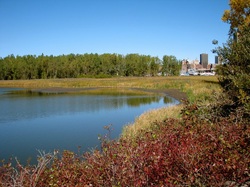Sustainability Councils

Times Beach Nature Preserve in downtown Buffalo N.Y.
The Learning Sustainability Campaign was formed in 2002 as a direct response to the week long conference "Learning Sustainability, Acting Like a Region in a Globalized World", held in Buffalo New York in October of 2001. The event was sponsored by the Environment and Society Institute from the University of New York at Buffalo, Erie County, and The City of Buffalo. Guests included Jane Goodall, Sylvia Earle, David Suzuki, Paul Hawken, and the Rocky Mountain Institute.
One of the direct outcomes of the conference was the creation of sustainability councils. The concept of a sustainability council is to bring together wide stakeholder groups, individuals, organizations and others interested working in a collaborative way to find sustainable solutions and a future that works. Sustainability Councils can be created inside governments, affiliated with individual projects, neighborhoods, communities and cities, and regions. The idea is to establish connectivity, communication, dialogue, and collaboration.
Promote Collaboration
Cities and other governments can work within their administrations to bring together various departments and interests in order to both discuss and plan strategies that promote both a sustainable society and a sustainable approach to governance.
Very often government departments and agencies work in what has been described as silos. That is, they work without regard to what other departments and agencies are working on, even though often many departments and agencies are working on similar, or adjacent projects.
There is a critical need to communicate between departments and intergovernmentally on virtually every project, budget, and initiative. Creating a sustainability council intragovernmentally or intergovernmentally is a strategy that is solution oriented and can be very cost effective and efficient.
For example, the sewer and sanitation department may be working on an infrastructure issue in the exact same location that the streets department is developing a project. It makes sense to coordinate and collaborate. The forestry division, and or parks department may have a project adjacent to the sewer and streets project. Collaborate. Save money, invest in projects together. This is a great way to find sustainable solutions to building better governance.
For another example, transportation, engineering, and planning departments can and should collaborate with health departments in order to help promote both public transportation and walkable communities. Infrastructure and campaigns to promote the public good can be addressed by sustainability councils.
Regional Sustainability Councils
Learning Sustainability advocates the establishment of the creation of regional sustainability councils. Our initial event, the 2001 Conference held in Buffalo NY was called "Learning Sustainability, Thinking Like a Region in a Globalized World." The context is clear. We must work together as regions in order to create a healthy economic, environmental, and social region.
Sustainability connects overarching themes including economics, society, and the environment. A regional sustainability council should be designed to plan for and promote a future that works. It must have representation and give voice to varied interests. A true sustainability council cannot be top heavy by interests representing any of the overarching themes if it is to expect a successful outcome. In other words a sustainability council that represents primarily business interests cannot be considered a true sustainability focused entity. In fact a Sustainability Council that is top heavy with political economic agenda's such as economic development is a false promise. Sustainability Councils must represent wide cultural interests as well and we believe that the real bottom line is the environment.
Quick Decisions and Efficacy
It is often a challenge to develop and manage wider discussions on any issue. This is particularly challenging in the area of sustainability planning. Discussions can be time consuming and to put it mildly, maddening. This is particularly true if you represent a professional discipline and know how to do things within your discipline. Sustainability requires patience and it requires the commitment to listen to the many often dissonant and dissenting voices that are represented by society. A Sustainability Council must make the investment in listening and carefully deliberating projects, programs, and strategies. Truly sustainable outcomes depend upon inclusion and patience. We live in a complicated world. And, have no doubt, solutions to almost all problems are possible. Take the time and success will follow.
Questions or for more information on establishing a Sustainability Council in your area: Jay Burney, email: [email protected]